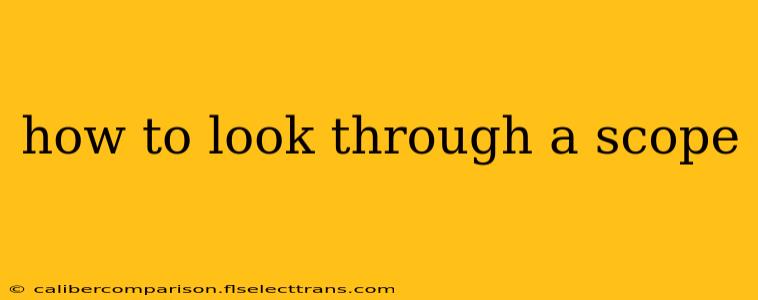Looking through a scope, whether it's a telescope, rifle scope, or spotting scope, might seem straightforward, but mastering the technique unlocks a world of clearer, sharper views. This guide covers everything from basic setup to advanced techniques, ensuring you get the most out of your optical instrument.
Getting Started: Essential Preparations
Before you even think about peering through the eyepiece, several crucial steps will dramatically improve your viewing experience.
1. Choosing the Right Location:
- Stability is Key: Find a stable surface to rest your scope. A shaky platform will result in blurry images. Tripods are ideal for telescopes and spotting scopes; rests or bipods are commonly used for rifle scopes.
- Minimize Light Pollution: For astronomical viewing, get away from city lights. Even slight light pollution can drastically reduce visibility.
- Consider Weather Conditions: Avoid viewing in strong winds or during rain or snow.
2. Setting Up Your Scope:
- Proper Assembly: Carefully assemble your scope according to the manufacturer's instructions. This ensures all components are correctly aligned and functioning optimally.
- Focusing: Before looking through the eyepiece, focus your scope on a distant object. This initial focus will save you time and effort later. Most scopes have a focusing knob; rotate it until the image is sharp.
The Art of Looking Through the Eyepiece:
This section focuses on the actual viewing process, covering techniques for both beginners and experienced users.
1. Proper Eye Placement:
- Find Your Sweet Spot: Position your eye close to, but not directly against, the eyepiece. There's a "sweet spot" where the entire field of view is visible. Experiment slightly to find it.
- Relax Your Eye Muscles: Avoid straining your eyes. Keep your eye relaxed and your posture comfortable for prolonged viewing sessions.
2. Focusing for Optimal Clarity:
- Fine-Tuning the Focus: Once you have a general focus, use the focusing knob to make fine adjustments for maximum sharpness. Slowly rotate the knob until the image is as crisp and clear as possible.
- Different Focal Points: Remember that different magnifications require different focusing adjustments. If you're changing magnification, you'll likely need to refocus.
3. Advanced Techniques for Enhanced Viewing:
- Using Your Breath: Holding your breath briefly while focusing can help minimize vibrations and improve stability, particularly at higher magnifications.
- Dark Adaptation: Allow your eyes to adjust to the darkness for about 20-30 minutes before astronomical observations. This will significantly improve your night vision.
Types of Scopes and Specific Considerations:
The viewing process can vary slightly depending on the type of scope.
Telescope Viewing:
Telescopes are primarily used for astronomical observations. Finding celestial objects often requires using a star chart or a computerized tracking system.
Rifle Scope Viewing:
Rifle scopes require precise alignment for accurate shooting. Proper eye relief (the distance between your eye and the eyepiece) is crucial for comfortable and safe use.
Spotting Scope Viewing:
Spotting scopes are excellent for observing wildlife and distant objects. They are generally easier to use than telescopes, often requiring less precise focusing.
Troubleshooting Common Problems:
- Blurry Image: Re-check your focus, ensure the scope is stable, and verify that the lenses are clean.
- Limited Field of View: Check your eye placement and make sure you're not obstructing the view.
- Distorted Image: This could indicate a problem with the scope itself. Contact the manufacturer or a repair specialist.
By following these steps and mastering the techniques described, you'll enhance your ability to observe the world through a scope, whether you're admiring the stars, targeting a distant animal, or preparing for a precision shot. Remember, practice makes perfect!

